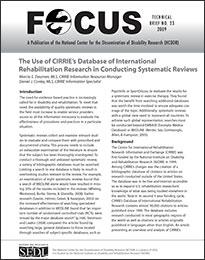FOCUS - Technical Brief Number 23: The Use of CIRRIE's Database of International Rehabilitation Research in Conducting Systematic Reviews

Authors: Marcia E. Daumen, MLS, CIRRIE Information Resources Manager, Daniel J. Conley, MLS, CIRRIE Information Specialist, SEDL
| Price: Available free online |
Available online: Full text, PDF
![]()
The need for evidence-based practice is increasingly called for in disability and rehabilitation. To meet that need, the availability of quality systematic reviews in the field must increase to enable service providers access to all the information necessary to evaluate the effectiveness of procedures and practices in a particular situation. Systematic reviews collect and examine relevant studies to evaluate and compare them with prescribed and documented criteria. This process needs to include an exhaustive examination of the literature to ensure that the subject has been thoroughly investigated. To conduct a thorough and unbiased systematic review, a variety of bibliographic databases must be searched.
To achieve a global representation, searches must be conducted beyond EMBASE (Excerpta Medica Database) or MEDLINE (Betrán, Say, Gülmezoglu, Allen, & Hampson, 2005). This edition of FOCUS tells how The CIRRIE Database of International Rehabilitation Research includes article citations from all disciplines that relate to disability or rehabilitation. The Center for International Rehabilitation Research Information and Exchange (CIRRIE) was first funded by the National Institute on Disability and Rehabilitation Research (NIDRR) in 1999. Among CIRRIE’s charges was the creation of a bibliographic database of citations to articles on research conducted outside of the United States. The database was to be free and Internet-accessible so as to expand U.S. rehabilitation researchers’ knowledge of what was being studied elsewhere in the world.
To achieve a global representation, searches must be conducted beyond EMBASE (Excerpta Medica Database) or MEDLINE (Betrán, Say, Gülmezoglu, Allen, & Hampson, 2005). This edition of FOCUS tells how The CIRRIE Database of International Rehabilitation Research includes article citations from all disciplines that relate to disability or rehabilitation. The Center for International Rehabilitation Research Information and Exchange (CIRRIE) was first funded by the National Institute on Disability and Rehabilitation Research (NIDRR) in 1999. Among CIRRIE’s charges was the creation of a bibliographic database of citations to articles on research conducted outside of the United States. The database was to be free and Internet-accessible so as to expand U.S. rehabilitation researchers’ knowledge of what was being studied elsewhere in the world.
